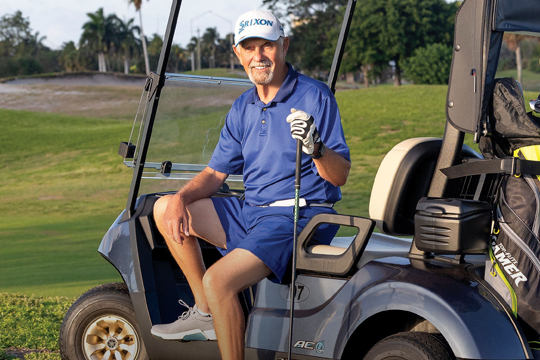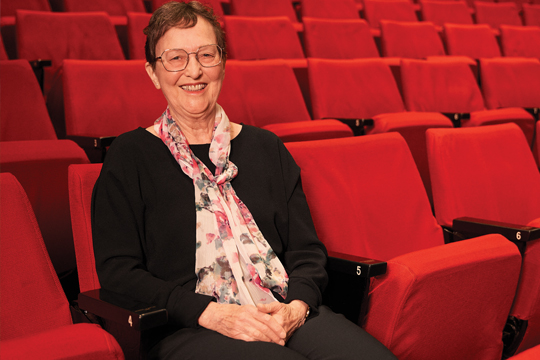
Three years into the pandemic, COVID has changed the way we live our lives and many of us are now more focused on our mental health. Photo: Vanica Louis
For Simon Sherry, pandemic life has resembled an Edward Hopper painting.
Known for capturing isolated, solitary images of Americans, Hopper’s most famous painting, Nighthawks, is of three men and a woman at the counter of a diner at night. While they’re close in proximity, there’s no connection, no eye contact and no interaction. It depicts a real sense of loneliness without being alone.
Sherry sees parallels in society given the public health policies that told people to physically distance to protect themselves and discouraged extroverted attributes, such as talking to others and seeking out interaction.
A clinical psychologist and professor in Dalhousie University’s Department of Psychology and Neuroscience, he says the biggest lasting impact of the pandemic will be the corrosive influence it’s had on Canadians’ mental health. University of Toronto research suggests about one in eight older adults experienced depression for the first time during the pandemic.
While that anxiety, depression and addiction will persist, Sherry says other serious but less obvious scars have emerged.
Most notably, people’s personalities have been altered. Having been told not to gather with others and to keep a six-foot distance for so long has led this behaviour to become a persistent part of everyday life.
“[Keeping our distance] can become a habit that eventually gets woven into your character,” Sherry says, noting that it can change how close someone stands to others at a store and their willingness to lean over a fence to talk to a neighbour. “I think for a generation, we may see a more or less permanent recalibration in the distance we expect from people.”
For Don McKay of Dartmouth, it’s been a heavy few years.
“I’m over 80, so it’s been stressful,” says McKay, who has been a member of Federal Retirees since 2008. “You had to be bloody careful because if you weren’t, you were going to get it and you didn’t know if you were going to survive or not. I’m in really good shape — I walk, work out and golf — but that’s not the point. When people are dying all around you, you don’t know if you’re going to be next.”
He and his wife have resumed their annual trips to their Florida condo, but he’s still cautious, avoids big crowds and is just fine with being the only person masking.
“It’s still around, so it’s always in the back of my mind. I’m not as bad as I was, but I’m on the lookout,” says the retired Coast Guard captain, joking about constantly scanning the horizon.
In Winnipeg, Joanne Craig says she and her husband rarely have people in their home now, nor do they visit others in theirs.
“I’m more reclusive,” says Craig, who worked in telecommunications for what was then called Communications Canada and joined Federal Retirees in 1998. “It’s not a matter of being anti-social. I’m more cautious and aware.”
Reduced contact has also extended to how often she’s in touch with friends and family who live in other cities.
That said, she doesn’t feel isolated. After doing Tai Chi in a snowy parking lot during shutdowns, Craig was happy when classes resumed, as everyone distances and masks, and to return to her gym when it reopened, which also requires masking.
She says it’s been great to see old friends and meet new members, but there’s been a notable drop in participation. Overall, people are sticking to themselves more.
“A few in our neighbourhood have become odd as a result of the pandemic. They’re not only less social, they’re actually cold and reclusive,” Craig says. “One person that we used to be very chatty and friendly with now looks away when we drive by. Her husband is ill, but she's not shared any of that information, which she would have done in the past. So, we have no idea how he's doing or if there's anything we could do to help.”
Craig was initially reluctant to go to her beloved ballet and symphony, as she was uncomfortable being so close to people who might be “breathing viruses.” But she’s gotten past that and now attends in a mask, and says people are generally mindful of others at performances.

Joanne Craig was initially reluctant to return to her beloved ballet in Winnipeg, but she’s past that and now attends wearing a mask. Credit: Rejean Brandt
In addition to extroversion, Sherry says openness to experience has also been impacted. Open people are curious and want to explore new places and try new things, but that was also discouraged to mitigate COVID-19.
“We were told to stay home and live a narrow life,” he says. “After several years of isolation and avoidance, I don't think we should be surprised to see that's had a lasting impact on human personality.”
At McMaster University, Jennifer Heisz, the Canada Research Chair in brain health and aging, says sticking with comfortable activities instead of being explorative or adventurous can impact the brain.
“If we're just doing the same thing over and over, it's not really training the brain to think outside the box,” she says.
That’s compounded by social isolation, loneliness and a lack of physical activity, which are risk factors for dementia and cognitive decline.
“We have to be really careful, especially at the later stages of life, where these sorts of fundamental stimulations are really important for keeping us and our brains healthy,” Heisz says.
The good news is that a little goes a long way. She says having a few key people you love and can trust and rely on in your life is enough. If they can support a healthier lifestyle and get you walking more, even better.
Heisz says that data she collected during the pandemic show a shift in why people wanted to exercise. It was less focused on strength and looking good, and more on feeling good and improving mental health.
The paradox was that poor mental health often got in the way of exercising, as people were too stressed and anxious, and fearful of associating with others in common spaces such as a gym.
“But the great thing is that something as simple as a 10-minute walk around the block has been shown to reduce anxiety and stress and boost mood,” Heisz says.
Carolyn Cudmore of Ottawa, who joined Federal Retirees in 2023, says she became more committed to improving her overall health and wellness these past few years.
This winter, she and her husband took skating lessons several times a week at rinks across the city with people of all ages and backgrounds.
“It’s been lovely. When we’re on the ice, there’s lots of cold air and high ceilings, and nobody's concerned,” Cudmore says. “Everybody lets their hair down and is open to the fact that we’re complete novices. It’s been super cool and I think it’s been the outlet that I missed.”
Recently retired from Global Affairs as a deputy director, she shrunk her social circle during the pandemic to have more selective, deep and positive relationships. While missing bantering with strangers, given that people are more cautious, she’s gotten to know her neighbours better. She’s apprehensive of crowds, so she and her husband have developed new hobbies and leisure activities. They make a point of walking four kilometres each day and spend more time in nature.
“We are better rested and generally calmer and more relaxed,” Cudmore says, in contrast to the stress and anxiety of the early days of the pandemic.
Practising self-care can help people feel they have control over their lives and bring comfort in unsettling times, says Peter Liu, a clinical psychologist in Ottawa. When it comes to mental health, he’s big on prevention and says there’s plenty people can do to help themselves, including limiting their exposure to bad news on television and social media, having regular contact with friends and family, and developing hobbies, especially ones that encourage creativity and self-expression.
That’s particularly important now that public health measures have been dropped, leaving many seniors feeling like society is no longer looking out for them, despite the existential threat COVID-19 still presents.
“Some may be feeling more anxious and at risk because people are not being cautious,” Liu says.
Sherry agrees and says seniors still pay a high price relative to other age groups.
Liu says many seniors are determined to look after their own health. They’ve accepted this is how life is right now and developed protective routines to cope without stress.
While some may feel it’s embarrassing to be in the minority taking precautions, he says people should take pride in taking care of themselves.
“Think, ‘I’m a survivor here. I’m going to make it through and do my best with what’s within my control’.”

